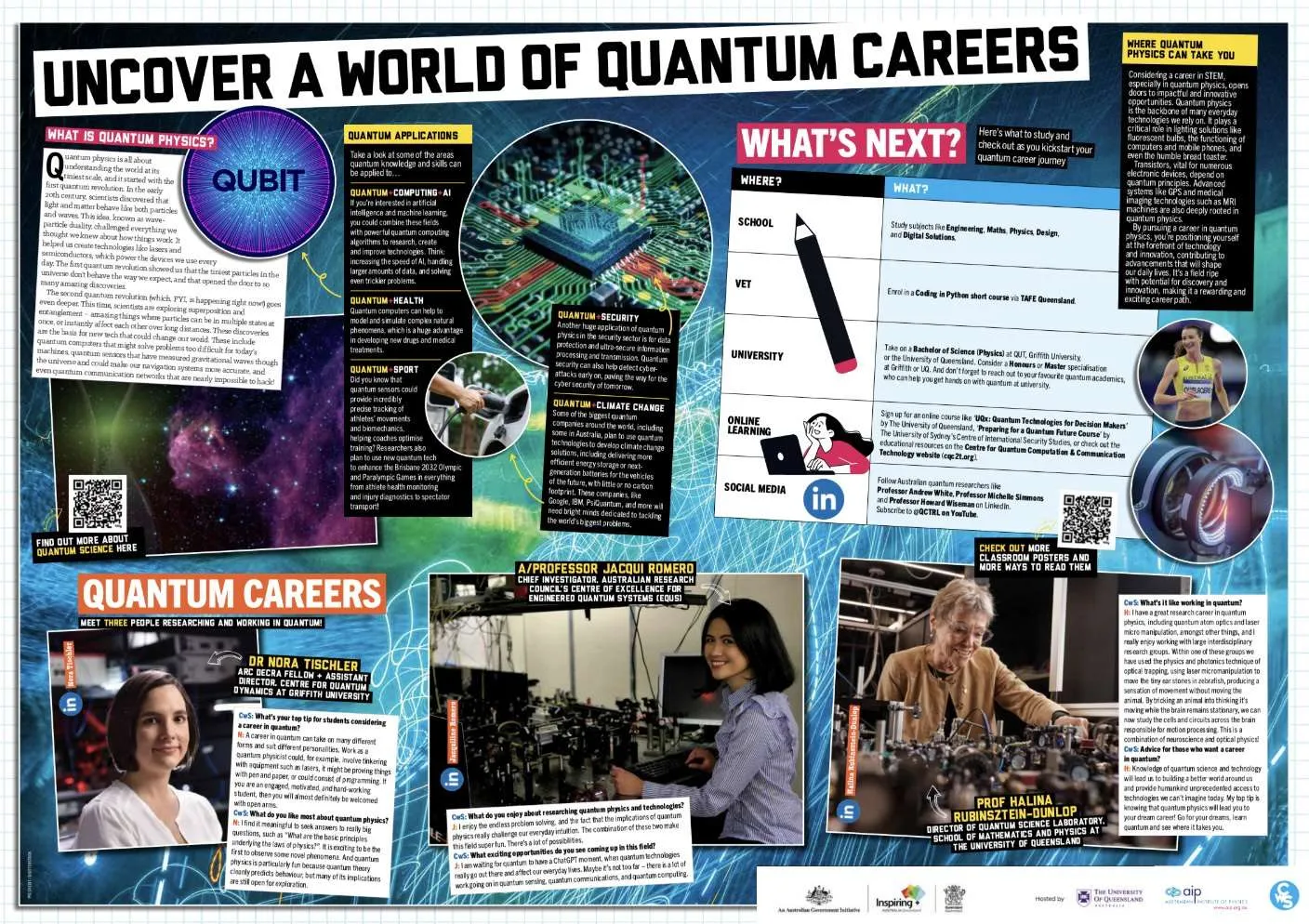Click on above image to download your A2 poster (double sided), or head to Quantum Careers Poster – Careers with STEM for more features and information.
Quantum careers (Interviews with Careers with STEM CwS)
Hear more from the quantum professionals featured on this poster.
Dr Nora Tischler
ARC DECRA Fellow + Assistant
Director, Centre for Quantum Dynamics at Griffith University

CwS: What’s your top tip for students considering a career in quantum?
N: A career in quantum can take on many different forms and suit different personalities. Work as a quantum physicist could, for example, involve tinkering with equipment such as lasers, it might be proving things with pen and paper, or could consist of programming. If you are an engaged, motivated, and hard-working student, then you will almost definitely be welcomed with open arms.
CwS: What do you like most about quantum physics?
N: I find it meaningful to seek answers to really big questions, such as “What are the basic principles underlying the laws of physics?”. It is exciting to be the first to observe some novel phenomena. And quantum physics is particularly fun because quantum theory cleanly predicts behaviour, but many of its implications are still open for exploration.
CwS: What exciting opportunities do you see coming up in this field?
N: The field of quantum physics is evolving quickly, with exciting progress being made both in experimental capabilities and on the theory front. Thanks to a growing quantum industry, there are also various new job prospects out there for quantum physicists that did not exist ten years ago.
A/Professor Jacqui Romero
Chief Investigator, Australian Research Council’s Centre of Excellence for Engineered Quantum Systems (EQUS)

CwS: What do you enjoy about researching quantum physics and technologies?
J: I enjoy the endless problem solving, and the fact that the implications of quantum physics really challenge our everyday intuition. The combination of these two make this field super fun. There’s a lot of possibilities.
CwS: What exciting opportunities do you see coming up in this field?
J: I am waiting for quantum to have a ChatGPT moment, when quantum technologies really go out there and affect our everyday lives. Maybe it’s not too far – there is a lot of work going on in quantum sensing, quantum communications, and quantum computing.
CwS: Top tip for students considering a career in quantum?
J: If quantum is really what interests you, just do it, don’t be scared. There are many aspects of quantum physics and quantum technologies needing different skills and there are many unanswered questions waiting for the most curious of students. Reach out to experts, remember that there are no stupid questions if you really want to know the answer.
Prof Halina Rubinsztein-Dunlop
Director of Quantum Science Laboratory,
School of Mathematics and Physics at The University of Queensland

CwS: What’s it like working in quantum?
H: I have a great research career in quantum physics, including quantum atom optics and laser micro manipulation, amongst other things, and I really enjoy working with large interdisciplinary research groups. Within one of these groups we have used the physics and photonics technique of optical trapping, using laser micromanipulation to move the tiny ear stones in zebrafish, producing a sensation of movement without moving the animal. By tricking an animal into thinking it’s moving while the brain remains stationary, we can now study the cells and circuits across the brain responsible for motion processing. This is a combination of neuroscience and optical physics!
CwS: Advice for those who want a career in quantum?
H: Knowledge of quantum science and technology will lead us to building a better world around us and provide humankind unprecedented access to technologies we can’t imagine today. My top tip is knowing that quantum physics will lead you to your dream career! Go for your dreams, learn quantum and see where it takes you.
CwS: What exciting opportunities do you see in your field using quantum technologies?
H: My work has its roots in both first and second quantum revolution, where the first revolution relates to wave-particle duality, and the second using concepts of entanglement and superposition. I am particularly excited about being able to develop quantum sensors and devices that will help us understand health-based problems and study important biological systems.
